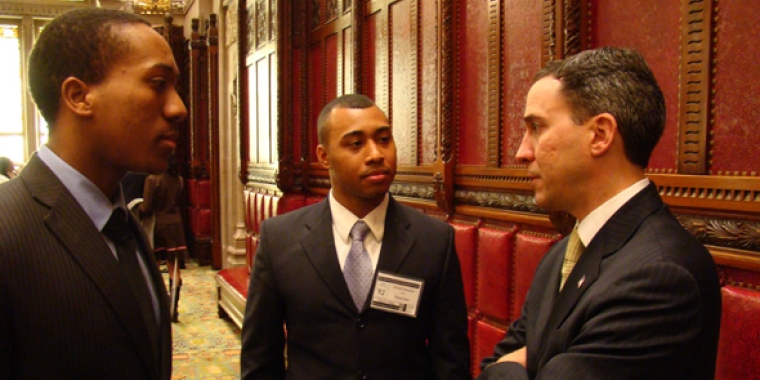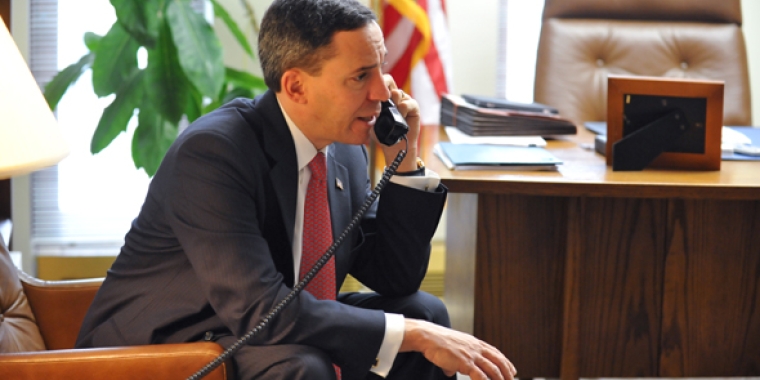From the Desk of Senator Jack M. Martins
Jack M. Martins
August 7, 2012
-
ISSUE:
- Local Government
-
COMMITTEE:
- Local Government
Getting Heads out of the Sand
I guess some might call me old-fashioned, but I still enjoy listening to talk radio. Even with the rise of online media, there is still something very personal about radio that I like. You get news and opinions of course, but it’s the sound and inflection of people’s voices that give you insight into the personalities and emotions surrounding a subject. Whether it be a long-suffering, fellow Mets fan or an author discussing his or her latest book, I admit that I often drive around the block or take a longer route to listen a little longer.
I found myself in just this position last week as I tuned into a program that debated the merits of this year’s Olympic opening ceremonies. While most everyone agreed that London put on quite a show, the controversy stemmed from their notable omission of some type of memorial or moment of silence on the 40th anniversary of the Munich Olympic Games. For those too young to remember, about halfway through the 1972 games in Munich, 11 Israeli athletes were kidnapped in the middle of the night and held hostage by a terrorist group. They were eventually shot and killed – assassinated. Inexplicably, the Olympic Committee (the IOC) this year declined requests to recall the event during the games.
I listened carefully to the various arguments and tried to grasp why the IOC made that particular decision, but I can only surmise that they are completely insensitive or much-too concerned about negative PR. They simply don’t want to remind the world of a horrific incident that flew in the face of everything the games stand for. Simply, they do not have the courage of their own convictions. They could and should have taken it as a teaching opportunity. The fact is, it did happen and while there’s no changing it we might be able to prevent it from happening again. However uncomfortable something makes us, the only way to learn from it is to first learn about it. They could have showed a younger generation just how ugly the world can be and why we so desperately need the unifying sportsmanship and solidarity of the Olympic Games. It’s a lesson that can be applied to everyone, big and small: sticking your head in the sand doesn’t mean something will go away.
That was precisely our motivation when we passed New York’s cyber-bullying law this past legislative session. Some argued that it wasn’t necessary, that bullying was only real when it was done in person, face-to-face. Yet that too would be ignoring reality. The truth is the internet is a social sphere where young people are all too easily singled out and victimized. Cyber-bullying gets out of control quickly because students are harassed at a distance, in front of a wider audience, and others can join in on the harassment anonymously. By some estimates, 50 percent of all teens have already experienced this uncomfortable phenomenon and too many of those stories end in violence or suicide.
New York’s law requires schools to develop a genuine protocol to dealing with complaints of email, texting, or online harassment and to assign an official to investigate the matters. Those persons will have to be trained on specifically handling these types of issues. Schools will also be asked to set up measures to prevent it from reoccurring while also developing a curriculum for kindergarten to 12th grade that stresses the responsible use of electronic communications as well as civility, citizenship and character. Simply put, we’re asking everyone to take their heads out of the sand and take action.
Will this be the ultimate answer to cyber-bullying? Probably not, but it’s an important first step. The internet has been like the wild west for far too long. We would never allow our children, or our neighbor’s children for that matter, to be victimized like this in person. We would race to stop it. So it’s a matter of perception for us adults who have never experienced cyber-bullying first-hand and have trouble wrapping our heads around it as a legitimate problem. But ask our young people and they will assure you that it’s very real. Our response should be as well.
Share this Article or Press Release
Newsroom
Go to Newsroom
A Day Spent in the Senate
April 4, 2011


